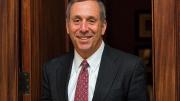Six months ago, the view from Mass Hall—or, as it happened, from my home office—was almost completely obstructed by COVID-19, an all-consuming public health crisis that continues to keep most of us in masks, on edge, and up at night, to say nothing of its profound social and economic consequences. It has laid bare gross inequities in our healthcare system that dramatically shape the lives and the deaths of people of color in America, inequities that ripple through our justice system and political system in ways that have led to some of the most dramatic and moving protests of my lifetime. Throughout the spring and summer, my calendar was filled with meetings dedicated to addressing the pandemic and racial and social justice. The deans, vice presidents, and I worked closely with one another to consider how Harvard might lead in a landscape that was constantly shifting. It was—without question—some of the hardest work any of us had ever done, and it continues today. Fortunately, we were certain of one thing: Nothing more disruptive could happen to our students.
We were wrong.
On Monday, July 6, US Immigration and Customs Enforcement announced that international students would not be allowed to stay in the country if they attended a college or university that, like Harvard, intended to offer its courses entirely online in the fall. Without warning, thousands of members of the Harvard community suddenly faced what one member of the faculty described as “the specter of deportation.” International students across the country were being used as pawns to try to force colleges and universities to open their campuses for in-person learning notwithstanding risks to public health.
Very few things in my career have kept me up at night, but the plight of our students—of students studying at institutions across the United States—disturbed me deeply. Early the next morning, I called Bill Lee, senior fellow of the Harvard Corporation; Diane Lopez, vice president and general counsel of the University; and John Manning, dean of Harvard Law School, to discuss the prospects of bringing a lawsuit to challenge the directive. My next call was to Rafael Reif, president of the Massachusetts Institute of Technology. Within 24 hours, Harvard and MIT had filed suit. Within 48 hours, more than 200 colleges and universities, and more than 70 higher education associations had submitted amicus briefs. All told, our institutions represented the interests of more than a million international students. Voices from across the political spectrum—attorneys general, mayors, companies, labor unions, and the US Chamber of Commerce—supported our cause and spoke out against the cruel and reckless measure.
For me, the nationwide effort was a resounding affirmation of a fundamental truth: Higher education in America is great because we recruit the best and the brightest from throughout the world. These individuals drive a virtuous cycle that creates a strong pull on the world’s most talented people regardless of their birthplace. On campuses across the country, extraordinary international faculty produce exceptional work, which attracts remarkable students from around the world who, in turn, provide ample inspiration and support. After graduation, some international students seek to stay in the United States, eager to enjoy the freedoms and opportunities we have here; some return home, forever enriched by the values we hold dear; all understand what it is to pursue knowledge unfettered and to contribute to a community that deepens and broadens understanding for the benefit of people everywhere.
On Tuesday, July 14, the government withdrew the directive. Now, with the luxury of hindsight, I find myself grateful for the entire ordeal. For a moment, it trained the sights of many good people on an injustice that could be remedied quickly. Our victory became a symbol of hope for the possibility of righting more complex and pernicious injustices down the line—and a model for how American colleges and universities, along with other institutions, could work together to speed change. As we enter an academic year unlike any other in the University’s history, in the wake of mass protests and on the brink of a presidential election, I am reminded every day that the only truly scarce capital is human capital. We must do everything within our power to nurture and protect our most valuable asset—the people who make Harvard the special place that it is.









